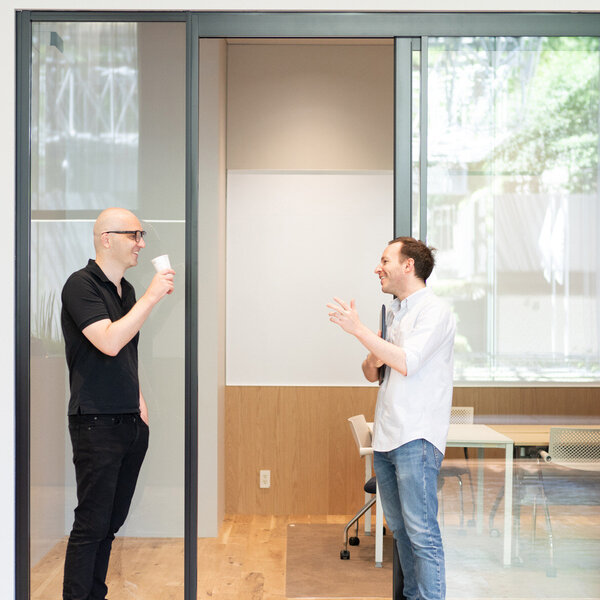
Michael
Spranger
Profile
Michael Spranger is the COO of Sony AI Inc., Sony’s strategic research and development organization established April 2020. Sony AI’s mission is to “unleash human imagination and creativity with AI.” Michael is a roboticist by training with extensive research experience in fields such as Natural Language Processing, robotics, and foundations of Artificial Intelligence. Michael has published more than 70 papers at top AI conferences such as IJCAI, NeurIPS and others. Concurrent to Sony AI, Michael also holds a Senior Researcher position at Sony Computer Science Laboratories, Inc., and is actively contributing to Sony’s overall AI ethics strategy.
Publications
Games continue to drive progress in the development of artificial intelligence.
Existing collaborative self-supervised learning (SSL) schemes are not suitable for cross-client applications because of their expensive computation and large local data requirements. To address these issues, we propose MocoSFL, a collaborative SSL framework based on Split Fe…
Continual Test-time Adaptation (CTA) is a promising art to secure accuracy gains in continually-changing environments. The state-of-the-art adaptations improve out-of-distribution model accuracy via computation-efficient online test-time gradient descents but meanwhile cost …
In this paper, we study an automatic hypothesis generation (HG) problem, which refers to the discovery of meaningful implicit connections between scientific terms, including but not limited to diseases, chemicals, drugs, and genes extracted from databases of biomedical publi…
Existing collaborative self-supervised learning (SSL) schemes are not suitable for cross-client applications because of their expensive computation and large local data requirements. To address these issues, we propose MocoSFL, a collaborative SSL framework based on Split Fe…
As deep learning blooms with growing demand for computation and data resources, outsourcing model training to a powerful cloud server becomes an attractive alternative to training at a low-power and cost-effective end device. Traditional outsourcing requires uploading device…
Supporting chefs with ingredient recommender systems to create new recipes is challenging, as good ingredient combinations depend on many factors like taste, smell, cuisine style, texture, chef’s preference and many more. Useful machine learning models do need to be accurate…
Many potential applications of artificial intelligence involve making real-time decisions in physical systems while interacting with humans. Automobile racing represents an extreme example of these conditions; drivers must execute complex tactical manoeuvres to pass or block…
Attempts at combining logic and neural networks into neurosymbolic approaches have been on the increase in recent years. In a neurosymbolic system, symbolic knowledge assists deep learning, which typically uses a sub-symbolic distributed representation, to learn and reason a…
When humans play virtual racing games, they use visual environmental information on the game screen to understand the rules within the environments. In contrast, a state-of-the-art realistic racing game AI agent that outperforms human players does not use image-based environ…
Countless possibilities of recipe combinations challenge us to determine which additional ingredient goes well with others. In this work, we propose RecipeBowl which is a cooking recommendation system that takes a set of ingredients and cooking tags as input and suggests pos…
Real Logic is a recently introduced first-order language where formulas have fuzzy truth values in the interval [0, 1] and semantics are defined concretely with real domains. The Logic Tensor Networks (LTN) framework has applied Real Logic to many important AI tasks through …
SATNet is an award-winning MAXSAT solver that can be used to infer logical rules and integrated as a differentiable layer in a deep neural network. It had been shown to solve Sudoku puzzles visually from examples of puzzle digit images, and was heralded as an impressive achi…
Understanding the relationships between biomedical terms like viruses, drugs, and symptoms is essential in the fight against diseases. Many attempts have been made to introduce the use of machine learning to the scientific process of hypothesis generation (HG), which refers …
In this paper, we study an automatic hypothesis generation (HG) problem, which refers to the discovery of meaningfulimplicit connections between scientific terms, including but not limited to diseases, chemicals, drugs, and genes extracted fromdatabases of biomedical publica…
Blog

March 9, 2023 | GT Sophy
From Research to Deployment in One Year - GT Sophy Is Now Available to All GT7 Players
I am proud to announce that, together with Polyphony Digital Inc. (PDI), we have globally released Gran Turismo Sophy in Gran Turismo™ 7 (GT7) PlayStation® racing simulation game, for the PS5™ console. GT Sophy is Sony AI’s superh…
I am proud to announce that, together with Polyphony Digital Inc. (PDI), we have globally released Gran Turismo Sophy in Gran Turi…

February 10, 2022 | Sony AI
革新的なAI「Gran Turismo Sophy™(グランツーリスモ・ソフィー™)」を発表
ソニーAI初となる、革新的なAI「Gran Turismo Sophy(グランツーリスモ・ソフィー、以下GTソフィー)」が英国の総合科学誌「Nature」(2月10日号)の表紙に掲載され、同時にこのプロジェクトの発表ができることを大変うれしく思います。NatureGTソフィーは、PlayStation®4のドライビングシミュレーター『グランツーリスモSPORT』を学習した革新的なレーシングAIエージェントです。GTソフィーはトレーニングを通じ、世界最高峰の…
ソニーAI初となる、革新的なAI「Gran Turismo Sophy(グランツーリスモ・ソフィー、以下GTソフィー)」が英国の総合科学誌「Nature」(2月10日号)の表紙に掲載され、同時にこのプロジェクトの発表ができることを大変うれしく思います。Natu…

February 10, 2022 | GT Sophy
Unveiling Gran Turismo Sophy™ : An AI Breakthrough
I’m thrilled to announce Sony AI's very first AI breakthrough - Gran Turismo Sophy which is featured on the cover of Nature magazine’s Feb 10th issue.NatureGran Turismo Sophy is a revolutionary racing AI agent that has learned to …
I’m thrilled to announce Sony AI's very first AI breakthrough - Gran Turismo Sophy which is featured on the cover of Nature magazi…
JOIN US
Shape the Future of AI with Sony AI
We want to hear from those of you who have a strong desire
to shape the future of AI.



